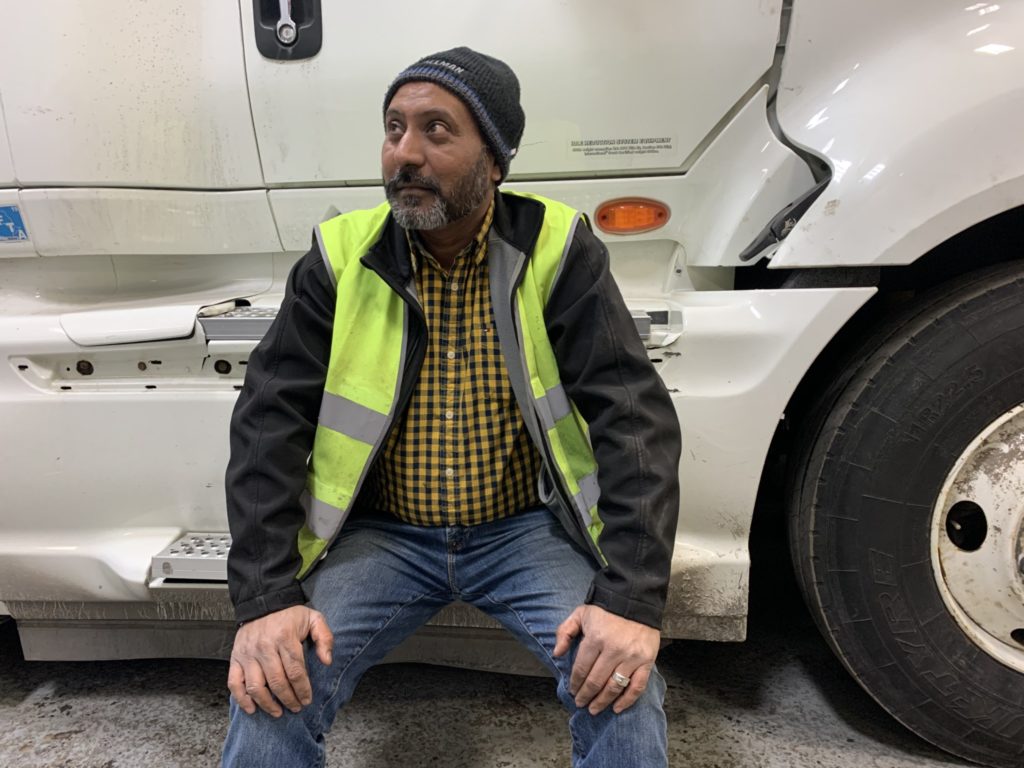The South Asian trucker: Under pressure from all sides

BRAMPTON, Ont. – In his hit Truck Union music videos, featuring gleaming rigs, beautiful women and fancy cars, Surjit Khan sings about an imaginary luxury life as a longhaul driver, a profession which has become a magnet for South Asians.
But beneath the facade of the glossy image portrayed by Khan lies a grim reality – a host of mental issues, triggered by an extremely stressful job.
The problem is exacerbated by the stigma surrounding mental health, especially in the community.

The Punjabi Community Health Services (PCHS) in Brampton, Ont., has been at the forefront of providing help to distressed South Asian truckers throughout the Greater Toronto Area. Brampton itself is home to thousands of drivers from the Indian state of Punjab.
Seven out of 10 calls the center receives are from truckers, many of them first-generation immigrants struggling to cope with the stress of their job.
After days on the road, some drivers turn to alcohol and drugs to relieve their stress, according to the center.
“Slowly some drivers just skip that fine line of taking alcohol for relaxation, and slip into addiction.”
– Mudassara Anwar, PCHS
“Slowly some drivers just skip that fine line of taking alcohol for relaxation, and slip into addiction,” said Mudassara Anwar, supervisor of the Mental Health and Geriatrics Program at the center.
Anwar said the addiction then leads to domestic violence, family breakups and job losses, ultimately ending up in depression.
Then the stigma and shame of mental health sink in too, with patients refusing to seek counselling, she said.
When they finally decide to seek help, it would be too late, Anwar added.
She also said that many truckers “stress out’ over their inability to properly supervise their children.
“Their kids do not do good in school, or they get engaged in activities which are not good for them. They are basically not completing their education because there is no check.”
She said the typical South Asian trucker is “under social pressure, community pressure and in-law pressure”, all contributing factors of stress.
Anwar leads a team of several case managers and other support staff, who are trained to offer “culturally appropriate” advice to patients in their own languages such as Punjabi and Hindi.
Variety of programs
The center offers a variety of free programs on mental health and addiction, and also works with other care partners in the community.
A common complaint among the truckers is that they feel isolated and not engaged enough in the society, said case manager Parneet Waraich.
They also feel that people judge them for not being educated, and not being ‘classy enough’.
– Case Manager Parneet Waraich
“And then they also feel that people judge them for not being educated, and not being ‘classy enough’. So, they always have to go an extra mile to get themselves validated.”
One of the cases the center dealt with recently was that of a 36-year-old trucker who suffered concussion and other injuries in a collision.
Soon he was diagnosed with psychosis and schizophrenia.
With no money and no one to help, the patient lived on milk until the center got involved with the local food bank to deliver hot meals to him. The patient was later sent to a therapist for further treatment.
The center, under the leadership of founder and CEO Dr. Baldev Mutta, provides help to about 1,000 people each year.
Talking therapy
Last summer, the Centre for Addiction and Mental Health (CMHA) in Toronto said that people of South Asian origin are 85% less likely to seek treatment for mental illness than those who identify as white.
To address the problem, CMHA is developing a culturally adapted form of Cognitive Behavioural Therapy catered toward the community.
Dr. Farooq Naeem, chief of general and health systems psychiatry at CMHA, is leading the project, which he calls a type of “talking therapy”.
Funded by Health Canada and supported by a number of institutions including PCHS and the Mental Health Commission of Canada, Naeem’s team is gathering information to launch the program later this year.
He said the response to the announcement of the project in December was overwhelming with hundreds of people offering to participate.
“I think that means people are becoming more aware in the community, they are becoming more familiar, and they are realizing the need to get help for mental health problems,” Naeem old Road Today.
- This feature was originally published in the March issue of Road Today.
Have your say
This is a moderated forum. Comments will no longer be published unless they are accompanied by a first and last name and a verifiable email address. (Today's Trucking will not publish or share the email address.) Profane language and content deemed to be libelous, racist, or threatening in nature will not be published under any circumstances.
Many truck drivers need help including some that are new to Canada. Many people new to Canada have been misinformed about what truck drivers working conditions are like. When I was trucking I seen this a lot among new drivers both from Canada and new to Canada. A better plan of supporting them when they are homeless and unable to drive is needed. I have been pushing for this for over 5 years. The current government doesn’t seem to care or the O T A as both groups tell these drivers to get help from family or friends. Many times insurance companies in Ontario Canada treatment is part of the problem.